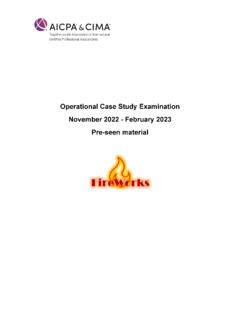Transcription of CIMA F1 Course Notes Chapter 1 Regulation of …
1 CIMA F1 Course Notes Chapter 1. Regulation of Accounting and Financial Reporting Strategic Business Coaching Ltd 2013. Personal use only - not licensed for use on courses 6. 1. Regulation of published accounts Financial Statements The annual report and financial statements (or published accounts) provide a range of information about the performance of the business, particularly its financial performance. The key statements of financial performance are: The financial position of the business, the Balance sheet, showing the assets ( buildings, materials, and cash) and liabilities ( bank loans and amounts owed to suppliers) of the business.
2 The income statement, or Profit and Loss account showing the income and costs over a period of time (often a year). Cash flow statements, showing the cash usage of the business over a period of time (often a year). Notes to the accounts providing more detailed accounting information. Accounts often also include a range of other information that the company may wish to provide to external parties such as: Chairman's statements, providing an overview of the business and its recent performance Strategic review, focused on the business' strategic performance and future plans.
3 Sustainability/environmental review Governance review/statement The need for Regulation of financial statements A number of different categories of stakeholder are interested in reading the annual report and financial statements of a company. These include: shareholders;. employees;. creditors;. banks and other loan creditors;. investors;. tax authorities;. other government departments; and the general public. Strategic Business Coaching Ltd 2013. Personal use only - not licensed for use on courses 7.
4 Potential investors may want to compare the performance of the business with that of other similar enterprises within the same industrial sector or more widely with other investments. They need to ensure that they can interpret the information contained in the financial statements and find meaningful information to help them make an investment decision. Financial statements therefore need to be: Reliable;. Transparent;. Consistent; and Comparable. Investors and other users must be confident that financial statements of different companies are comparable.
5 This means that there must be some Regulation of financial statements to ensure a level of consistency across the board that makes comparison of the financial performance of different companies meaningful to the various stakeholders. Transparency and full disclosure of relevant information are important to all users. Regulatory regimes differ from country to country From country to country, regulatory regimes differ. This can be for a number of reasons. Differences in law and tax Differences in national laws give rise to some differences in the way financial statements are put together.
6 Each country can have its own company law or tax regimes meaning that each country will need a different regulatory approach. In systems such as those on the continent of Europe much of the detail of these regulations is contained in the national law. The nature of the political system may affect the degree of control exerted by the government over accounting information and the extent to which different factors need to be disclosed. For example, policies pursued by the government on the environment may lead to a requirement for companies to disclose the impact of their business on the countryside or to make detailed disclosures in respect of carbon emissions.
7 History and culture The general culture of the country, and in particular the business culture, may also affect disclosure requirements. Countries with highly developed capital markets may require more information that will be useful to potential investors on those markets. This information will need to be made publicly available to satisfy the demands of potential investors for sufficient information to enable them to make realistic investment decisions. Strategic Business Coaching Ltd 2013. Personal use only - not licensed for use on courses 8.
8 The nature of the shareholding public Different countries tend to have different types of shareholders. In countries like the UK or US the majority of shareholders are large institutions, while elsewhere there can be more concentrated ownership with more owner involvement in management. In many Spanish speaking countries and many parts of Asia more large companies are owned by families or individuals. There may be greater requirements for accountability where a company is owned by a large number of investors rather than by a family or a small group of individuals.
9 As such, these countries are likely to require a higher level of Regulation . Problems with differences in accounting requirements Different accounting policies in respect of items such as financial instruments, leasing, foreign currency or intangible assets can lead to very different accounting results which makes it difficult for investors to interpret and compare results. The differences are also an obstacle to trade because they make it more difficult for companies to begin trading in other countries.
10 A multinational group of companies has a much greater administrative burden owing to this disparity between national accounting requirements. The multinational must produce reports in different countries on the basis of different requirements. For multinational companies this creates the following problems: Financial statements may need to be prepared on a different basis in different countries. Difficulties for the company's investors to interpret and compare results. Greater administrative burden and compliance costs.

